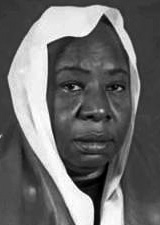Khalida Zahir (1927 – 2015) (sometimes written in English as Khalda Zahir) was a Sudanese Khalida Zahir

The Guardian, 23 June 2015
Khalida Zahir (1927 – 2015) (sometimes written in English as Khalda Zahir) was a Sudanese physician and women’s rights activist. She was born in Omdurman. She graduated from the Kitchener School of Medicine (at what is now the University of Khartoum) in 1952, along with Z Serkisiani, and together they were the first female doctors of medicine in Sudan. She founded the Young Women’s Cultural Society with Fatima Talib in 1948. The first Sudanese women’s organization, it provided education for women on health, reading and writing. She was also among the founders of the Sudanese Women’s Union in 1952, an organization which campaigned for suffrage and labour rights. Zahir went on to become head of paediatrics at the Sudanese ministry of health. She retired in 1986.
Sudanese women have benefited from a law giving them equal pay for equal work since 1973, and have enjoyed mandatory representation of at least 25% in parliament since 2005. Many now work as ministers and advisers to the president, as high court judges, academics and ambassadors. These successes did not happen overnight or effortlessly, and one of the leading pioneers who helped to pave the way for such a situation was Khalida Zahir, who has died aged 88.
Khalida was born in Omdurman to Fatima Arbab and Zahir Assadati, an officer in the Sudan Defence Force. Her family and my uncle had close links throughout the years, mainly due to shared left-leaning political beliefs. Unusually in the 1930s, Khalida’s father supported her wish to go to secondary school, although others, both inside and outside the family, were against such a radical idea. She passed her school certificate at the Unity school in Khartoum, and when her success came to the attention of Emily Shore, the wife of Sir Stewart Symes, governor general of Anglo-Egyptian Sudan, Shore lobbied the Kitchener School of Medicine(at what is now the University of Khartoum) to allow Khalida to attend. In the event Khalida was one of two young women accepted that year, and they went on to graduate as the first female Sudanese doctors of medicine.
For Khalida and the small number of other women graduates, however, hurdles in the workplace were almost impossible to clear. The very principle of working women was rejected on social control and religious grounds, and women who did manage to get into the workplace were never offered permanent jobs or a pension. Frequently stones were thrown at them on their way to work and back, and they had to be protected by family and friends.
Angered by such treatment, in 1946 Khalida co-founded, with Fatima Talib, the first Sudanese women’s organisation – the Young Women’s Cultural Society, which taught women to read and write and gave them advice about health and avoiding superstition. In 1952 she was one of 10 young women who established the Sudanese Women’s Union, which campaigned for female suffrage and the right of women to work freely in all areas of employment. She was also a mentor to the writer and women’s rights activist Fatima Ibrahim, who became Sudan’s first female member of parliament in 1965. Throughout these activities Khalida’s hallmark was her tolerance; she cooperated with people of all persuasions and backgrounds, always keeping her mind open and steering away from tribal prejudices.
Parallel to her political work, Khalida also concentrated on her medical career, treating poor people free of charge in her clinic. Eventually she became head of paediatrics at the ministry of health, retiring from that post in 1986.
Her husband, Mohamed Mahgoub, a secondary school teacher, predeceased her. She is survived by her daughters, Suad and Maryam, and by her sons, Ahmed and Khalid.
